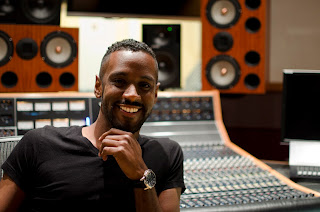Carlos spoke with SoundAdvice about his piece and preparations for the upcoming readings.
 |
| Composer, film scorer, and performer Carlos Simon |
American Composers Orchestra: What was your reaction to finding out your piece had been selected for the Underwood New Music Readings?
Carlos Simon: As young composers, it is a habit to apply to every competition, new music reading and festival possible. More often than not, you receive so many "no's" before you actually get a "yes". So to actually have been chosen for one of the most prestigious orchestral readings in the country has been one sheer amazement. I'm still pinching myself.
ACO: You are an accomplished film composer and winner of the 2015 Marvin Hamlisch Film Scoring Contest. Plagues of Egypt from the Book of Exodus, from the point of view of the enslaving Pharaoh, is the story you are telling with your piece. Can you talk about which musical elements evoke this narrative?
CS: Out of the many stories from the Bible, I found the Plagues of Egypt to be the most terrifying. It is packed with pure horror. There's nothing more terrifying than imagining a swarm of frogs, lice and other pestilence invading your personal space. Bassoons and contrabasses playing short and fast lines in their lower register represent the masses of frogs or violins playing high, shrill notes chaotically illustrate the pestilence. However, the most important element in this piece is Pharaoh's reaction to these events. I wanted to show his stubbornness and the gradual break down of his pride.
ACO: Suppose you were writing this work as a film score instead of a stand-alone orchestral work, what differences would there be?
CS: Ironically, I compose most of my pieces like this. I am a very visual person. While there may not be a film associated with what I'm writing, I try to imagine a film being played with my music. One of my teachers, Michael Daugherty, taught me that dialogue, sound, and visual effects could all be a part of my music without actually being present. Given that, if I were writing this work as a film score I would imagine that the piece would not change much.
ACO: What have you done with your piece, score, and parts in preparation for the Underwood New Music Readings?
CS: It is such an privilege to be working with an amazing orchestra. It is one that I do not take lightly. I have dedicated many countless hours (and sleepless nights) to making sure that the score and parts are as clear and concise as possible. That means a lot of proofreading, editing and revising.
ACO: What do you hope to gain from the workshops, and the feedback and guidance of mentor composers Derek Bermel, Sarah Kirkland Snider and Stephen Hartke?
CS: I'm extremely excited to work with such well established composers as well Maestro Manahan. I'm looking forward to gaining insight as to how I can make Plagues of Egypt a better piece. My hope is to compose five more pieces inspired by biblical stories such as David and Goliath, the Battle of Jericho etc. Gaining mentorship and fostering a professional relationship with such well skilled composers will hopefully help to create better music .
Follow Carlos on Twitter, Soundcloud

No comments:
Post a Comment